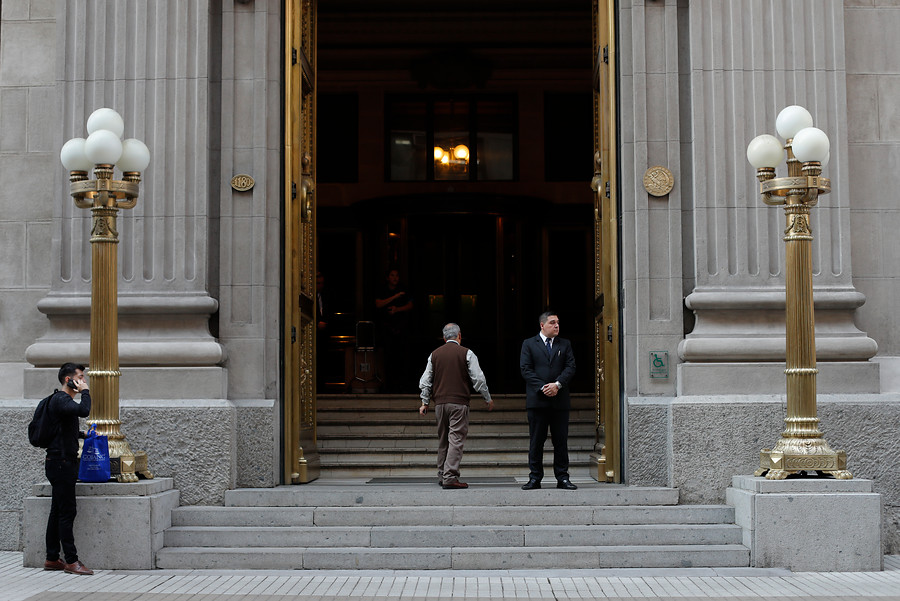Economist Roberto Pizarro Hofer is an outspoken dissident of the neoliberal positions of several of his colleagues, whom he has publicly challenged for their position on the possibility of a new Constitution.
He was Minister of Planning and Cooperation (now the Ministry of Social Development) in the government of Eduardo Frei Ruiz-Tagle, and his vast curriculum vitae also indicates that he has been an international consultant for the IDB and a United Nations official, as well as ambassador to Ecuador. A Socialist by conviction, although he has been away from the party since 2009, when he resigned due to political differences, today he is part of Plataforma Socialista.
In this interview with El Desconcierto, Pizarro refers to the clear economic advantages that would lead to the country’s development if the Magna Carta is approved on 4 September. And he refutes the alarmist theses of those who want to maintain the subsidiary role of the State of the current Pinochet Constitution.
In his opinion, the outlook is clear: “The defence of the Rejection by economists, employees of big business, is irresponsible. It will generate instability and increase insecurity and social violence”.
“On the other hand, the Approval will guarantee the transformations demanded for years by citizens and will generate conditions to recover economic growth, with social and environmental balances,” he says.
– In a recent interview with El Mercurio, economist Vittorio Corbo criticised the new Constitution because it makes many social rights explicit, but weakens the institutional framework required for growth and the generation of the necessary resources. What is your opinion of this statement?
Economist Corbo defends big business. They are his bosses. And he protects them because the 1980 Constitution, which has allowed them to accumulate huge fortunes (50% of wealth is in the hands of the richest 1% in Chile), suits the big businessmen. And it seems that it is not understood that the 18-O and the new Constitution are the response to 40 years of injustices and abuses of an economic system that enriched a minority at the expense of 90% of Chileans.
The new Constitution makes explicit essential social rights, which have been violated by an unjust economic system. But the institutional framework is not weakened but strengthened. The new Constitution strengthens public institutions through clear property rules and transparent economic regulations, with an autonomous Central Bank, institutions for the defence of competition, anti-corruption and consumer protection, among others. But the new Constitution also adds an additional institutional advantage, which conservative economists do not understand: ensuring social rights for all families. The fact that health, education, housing and social security are rights will translate into a substantial improvement in the so-called “social capital”, with positive effects on productivity and international competitiveness, an essential condition for promoting greater growth. Chile will be able to have growth with social cohesion and environmental balance. This is, in the end, true development.
– Meanwhile, another group of economists called Convergencia Transversal – including José de Gregorio, Manuel Agosín, Joseph Ramos and Alejandro Micco – points out that the new Constitution could “generate important risks and uncertainty in economic matters” in Chile. Is there a campaign of terror from the world of economists?
This is a biased discourse in favour of big capital. I do not see risks and uncertainties with the new Constitution. The risks and uncertainties are present in the 1980 Constitution. International risk assessment firms, such as Bloomberg and Morgan Stanley, rate the new Constitution as very reasonable and, to these opinions, prominent international economists (including Mazzucato, Ha-Joon Chang and Piketty) add that the new Constitution “will produce security and sustainable growth for Chile’s prosperity”.
The danger is in the Rejection. Conservative economists have a hard head. They forget the 18-O and the No+AFP protests, the women defending parity, the students against the CAE, the environmentalists against the sacrifice zones. Agosin, Ramos and Micco, instead of understanding the point of view of the majorities, who demand fundamental rights, have opted for the defence of big capital. Their defence of the economic elite is irresponsible.

JULY 23, 2022 / PUERTO MONTT A merchant man at the Alerce Norte Free Fair showing the new Proposal for the Political Constitution of the Republic of Chile. PHOTO: FELIPE CONSTANZO / AGENCIAUNO
-Do you believe that the new Constitution will allow for the recovery of growth?
It is the only way. The rentier growth, based on natural resources, which characterises our economy, is exhausted. In order to recover growth again, new sectors of activity are required, which add value to natural resources. This is what will allow us to boost economic activity once again.
GDP has been declining year after year (and not only because of the pandemic, but during the decade 2010-2020) and with dramatic stagnation of productivity. The end of the subsidiary state, enshrined in the new Constitution, opens space for public policy to promote new productive activities and aim for economic diversification (Article 182.1). The state in the new Constitution, no longer subordinated to the markets, will have the authority for it to set up companies and to make economic policy in favour of new transformation sectors, which serve to generate employment and improve productivity.
The current production model, based on mining, forestry and fishing, is exhausted and does not generate enough work. Industrial fishing has reduced marine fauna, copper mining operates at low grades and the forestry sector has destroyed agricultural land and is in conflict with the Mapuche people. The production model needs to be changed and this requires a state that is not disciplined by the market, but the other way around.
– Another complaint of several establishment economists concerns the weakening of property rights in mining and water. In your opinion, are there disadvantageous aspects of the proposed new constitution?
On the mining issue, article 145 of the new Constitution ratifies the caution on the absolute, exclusive, inalienable and imprescriptible dominion of the State over all mines. However, it does not propose nationalisation and, as now, private activity will have no impediment to its operation. As for the regulatory requirements, contained in other mining norms, Joaquín Villarino himself, president of the Mining Council, believes that they are similar to those of the current Constitution. “What is established in the Constitution is something that mining is doing,” he told La Tercera on 16 May.
As for water, in the midst of a dreadful drought and with families in the north depending on water trucks, it was inescapable that the new constitution would define water bodies as inappropriate natural common goods, to guarantee an essential human right to water and sanitation for every person and community. This is the priority, as in all countries of the world. Chile was a rare case where water was not prioritised for human consumption. Now, for economic sectors, such as mining and agriculture, the National Water Agency, established in the new Constitution, will be able to allocate the corresponding water authorisations, along with ensuring its responsible and sustainable use, required by the productive sectors. Nothing could be more reasonable. Life comes first.
– Let’s move on to other assertions that have been made in this constituent process: Can the plurinational state and regional autonomies limit economic development, as sectors of the Rechazo have criticised?
Not at all. On the contrary, regional autonomies enhance economic development. In fact, the regionalisation contained in the new constitution is a great opportunity for growth. The regions will have the tools to become centres of economic development and thus help the country as a whole to overcome the stagnation of productivity and productive capacity that has been affecting it for a long time.
Decentralisation is a long-standing demand. And now, inefficient and undemocratic centralism will be left behind. This will certainly require a challenge for the legislature to shape this new relationship between the central power and the regions.
On the other hand, the autonomy of revenues and expenditures for the fulfilment of regional competences requires them to adjust to criteria of financial responsibility and sustainability and to the principles contained in the framework of the NC. In addition, the State will continue to collect most taxes centrally. Chile will remain a unitary country.

Agency UNO
– Another issue: is the autonomy of the Central Bank well protected in the proposed Constitution?
The autonomy of the Central Bank is fully safeguarded by Art. 357.1 of the NC and, of course, like all state bodies, in a democracy, it must be subject to oversight. This, curiously, displeases economist Corbo; but it is obvious that if any of its advisors do not fulfil their responsibilities, the President, the Legislative Power or even a majority of the Central Bank’s own Council have the right (and obligation) to accuse them of non-fulfilment of their duties. The accusation will be resolved in the Supreme Court. Nothing strange and very healthy for democracy. This does not violate the autonomy of the Central Bank. Central Bank advisors are not gods and should be subject to citizen and institutional control.
– It is also said that the new Constitution would weaken the protection of competition by excluding economists from serving as judges in the Competition Tribunal. Is this so?
No, it does not. Article 99 of the new Constitution duly guards against market abuses: it prevents and condemns them. It could not be otherwise given the massive corporate corrupt practices lived with collusion in recent years. The established rule seems entirely reasonable and common sense. Now, the preoccupation that there are no economists and only lawyers in the Competition Tribunal is a completely irrelevant issue and seems more like, for some establishment economists, a curious trade union claim. If the lawyers deem it appropriate, they can take advice from competent economists and that’s the end of the matter.
-As for financing, some economists from various universities have estimated the annual cost of the new constitution to be between US$ 28.5 billion and US$ 45 billion. Do you agree with these estimates?
I have not done the calculations. What I can say is that recovering universal social rights certainly has a high cost. This explains why the tax reform, in full operation, means around US$ 12 billion. And the need to pass it is unavoidable. This must be understood by society as a whole and especially by the high-income sectors, who have the responsibility to make the greatest contribution to building a society in which social cohesion prevails.
– One of the statements heard in conversations in cafés or on the street is where the resources to finance the rights contemplated in the new Constitution will come from. What will be the means of financing?
The resources to finance the rights contemplated in the NC will be the result of a fairer tax system, such as the one recently proposed by the government. Higher taxes on higher income sectors, real royalties on natural resources, elimination of unjustified exemptions and, of course, a substantial reduction in tax avoidance and evasion. To this will be added the resources coming from more and better growth, with higher productivity, no longer concentrated only in the exploitation and export of natural resources, but in diverse economic activities.










